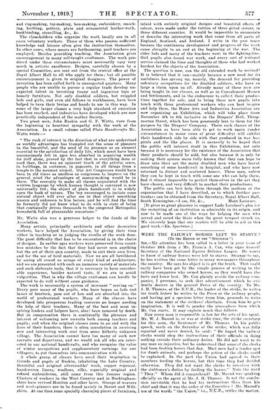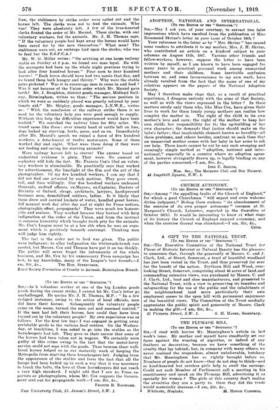WERE THE RAILWAY HORSES LEFT TO STARVE ? (To THE
EDITOR OF THE " PECTATOR."1 SIR,—My attention has been called to a letter in your issue of October 18th from a Mr. Francis A. Cox, who signs himself Secretary of the National Equine Defence League. He tennis to know if railway horses were left to starve. Strange to say. he has written the same letter to many newspapers throughout the country. He says his object is to get the truth. That could easily have been got by the simple process of writing to the railway companies who owned horses, as they would have the facts and know best. Mr. Cox plainly avoids the railway coatponies, I presume, to seek that advertisement which he evidently desires in the general Press of the counti;y. To Mr. J. H. Thomas, of the N.U.R., the leader of the strike, he writes for truth before he writes to the Press or the railway people, and haVing got a specious letter from him, proceeds to write on the statement of the strikers' chieftain. From him he gets inspiration. It is well to ponder the atmosphere front which Mr. Cox starts. It may explain much that follows.
Now every man is responsible in law for the acts of his agent. Mr. W. J. Mound is, or was at strike time, the strike secretary for this area, the lieutenant of Mr. Thomas. In his public speech, made on the Saturday of the strike, which was fully reported and never denied, he said : " He hoped the railway clerks would obey The instructions of their officials in doing nothing outside their ordinary duties. He did not want to do any man an injustice, but he understood that some of the clerks had been feeding horses that day. Most men had a tender spot for dumb animals, and perhaps the action of the clerks could be explained. In the past the Union had agreed to their members feeding the horses, but this time they had decided otherwise. They did not want the clerks to interfere with the stablemen's duties by feeding the horses." Note the word " They." Whom did it comprehend? Mr. Mound was speaking officially as the agent of Mr. J. H. Thomas. Is not the conclusion inevitable that he had his instructions thus from his chief and that it was the order of the Executive ? Mr. Mound's use of the words ".the.Union," i.c., N.U.R., settles the matter, Now, the stablemen by strike order were called out and the horses left. The clerks were not to feed the animals. Who was? They were absolutely left. A few of the true-hearted clerks flouted the order of Mr. Maund. These clerks, with our voluntary workers, fed the animals. Mr. J. H. Thomas says, " If the voluntary people had kept away the horses would have been cared for by the men themselves." What men? The stablemen were out, an embargo laid upon the clerks; who was to feed but the R.S.P.C.A.?
Mr. W. G. Miller writes : "On arriving at one large railway stable on Sunday at 2 p.m. we found one man loyal He with the managers had been up the whole night previous trying to look after four hundred horses." Four men to four hundred horses! "Each horse should have had two meals that day, and we found them both hungry and thirsty." Why were the stable gates picketed ? Was it to encourage men to come in and feed ? Was it not because of the Union order which Mr. Maund gave forth? Mr. J. Roughton, district goods manager, Midland Railway, Birmingham, writes us thus: "The serious position in which we were so suddenly placed was greatly relieved by your timely aid." Mr. Shipley, goods manager, L.N.W.R., writes us: " With the conclusion of the railway strike there is no need for the voluntary help you were good enough to supply. Without this help the difficulties experienced would have been tenfold." We searched the railway lines for fifty miles. We found cases like these : over ninety head of cattle left on line, dogs looked up starving, fowls, geese, and so on. Immediately after Mr. Maund's speech we raised a force of five hundred workers, a detachment of twelve motor-cars. Some of them worked day and night. What were these doing if they were not feeding and oaring for starving animals?
Were railway horses left to starve? The answer based on undoubted evidence is plain. They were. No amount of sophistry will hide the fact. Mr. Francis Cox's libel on voluntary workers is abominable. He practically says they worked for advertisement, the limelight of the film and the art of the photographer. Of my five hundredworkers, I can say that I did not find one actuated by such motives. They gave sweat, toil, and time willingly. Our five hundred workers embraced Generals, ex-Staff officers, ex-Mayors, ex-Captains, Doctors of Divinity of Oxford, clergy, architects, lawyers, hard-pressed business men, demobilized soldiers, ladies. Is it likely that these drew and carried buckets of water, handled great horses, (lid manual work day after day and at night for Press notices, photographic effect, propaganda? They were much too honourable and zealous. They worked because they burned with fiery indignation at the order of the Union, and from the instinct of common humanity which brought forth pity for the animals. Mr. Cox's League must be at a low ebb when he uses an argument which is positively beneath contempt. Thinking men will judge him rightly.
The fact is the order not to feed was given. The public were indignant; to allay indignation the whitewash-brush was needed, but Messrs. Cox and Thomas have put it on too thickly. The public will never forget the inhumanity of the whole business, and Mr. Cox by his unnecessary Press campaign has lost, to my knowledge, many of the League's best friends.—I
SRI, Sir, &c., THE HON. SUPERVISOR,
Royal Society Prevention of Cruelty to Animals, Birmingham Branch.







































 Previous page
Previous page